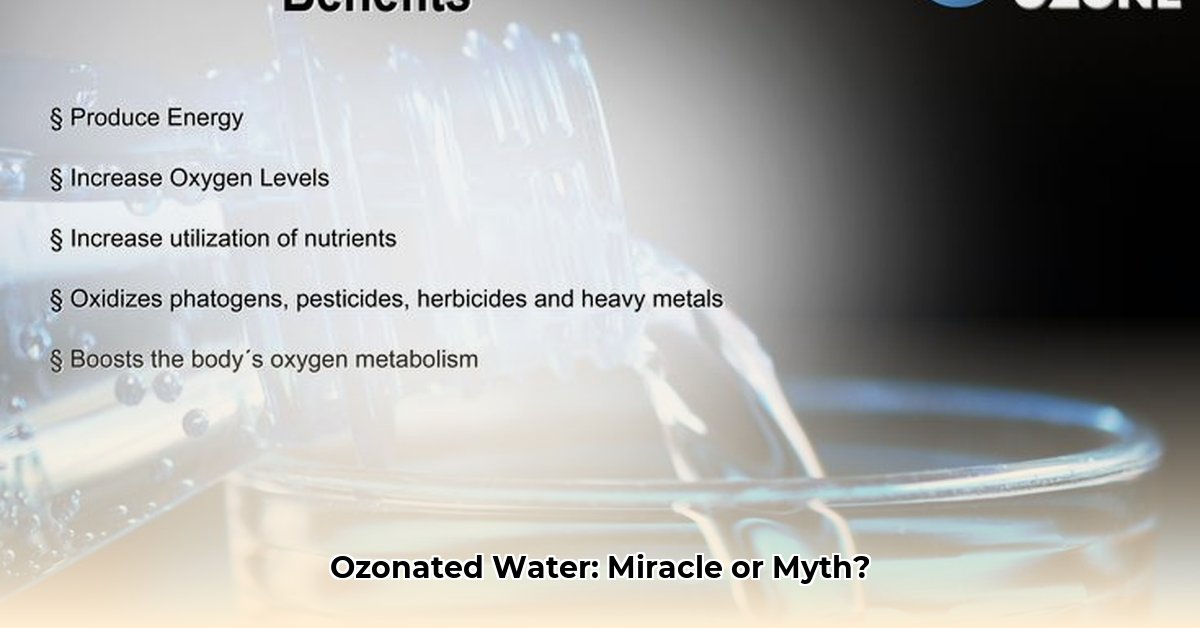
Understanding Ozonated Water: Hype vs. Reality
Ozonated water, water infused with ozone gas (O₃), is generating significant buzz due to purported health benefits. However, separating fact from fiction requires a careful examination of the available scientific evidence. While ozone's potent disinfectant properties are well-established—leading to its widespread use in water purification—many health claims surrounding its ingestion remain largely unsubstantiated.
This article explores the current understanding of ozonated water, differentiating between established applications and those lacking sufficient scientific backing. We will cover its role in water purification, examine the limited evidence supporting certain health claims, and emphasize the crucial need for further research. It's vital to approach this topic with a balanced perspective, avoiding unsubstantiated hype and prioritizing evidence-based information.
Is ozonated water a miracle cure-all, or is the hype outpacing the scientific evidence? Let's delve into the data.
Benefits of Ozonated Water: What the Science Says
The antimicrobial properties of ozone are undeniable. It effectively eliminates bacteria and viruses, making it an indispensable tool in water treatment. Many municipalities use ozone to ensure the safety and purity of drinking water. This established application provides a strong foundation for understanding ozonated water's potential benefits. However, extrapolating this efficacy to direct health benefits through ingestion requires much more investigation.
While studies suggest potential applications in wound healing and oral health, the evidence remains inconclusive. Some small-scale studies hint at positive outcomes, yet larger, more rigorous trials are needed to confirm these findings and fully understand any long-term effects.
Claims suggesting ozonated water's efficacy in combating cancer or urinary tract infections (UTIs) are currently unsupported by robust scientific evidence. While theoretically ozone's antimicrobial effect could be beneficial within the body, the mechanisms and long-term effects of ingesting ozonated water require considerably more research.
Dr. Anya Sharma, a leading researcher in environmental microbiology at the University of California, Berkeley, notes, "While ozone's effectiveness in water purification is beyond doubt, translating this to direct human health benefits through oral consumption requires significantly more rigorous study. Currently, the available evidence is insufficient to support many of the wider health claims."
Are the purported benefits of ozonated water backed by strong scientific evidence, or do they mainly represent promising areas of future research? The answer remains nuanced.
A Critical Look at the Evidence: A Balanced Perspective
The use of ozonated water for water purification is firmly established and deemed safe by regulatory bodies like the FDA for bottled water applications. Nonetheless, extending this safety profile to claims of broader health benefits requires caution. Many touted health benefits lack the robust scientific support needed for definitive conclusions.
Here's a summary reflecting the current state of evidence:
| Application | Evidence Level | Key Considerations |
|---|---|---|
| Water Purification | Strong | Widely accepted and proven safe; a cornerstone of municipal water treatment systems. |
| Antimicrobial Properties | Moderate | Proven in vitro (lab setting), but in vivo (in the body) effects require further investigation. |
| Wound Healing | Moderate | Shows promise, but more extensive research is needed to determine its effectiveness compared to standard treatments. |
| Oral Health | Moderate | Preliminary studies suggest potential benefits, but larger, randomized controlled trials are crucial. |
| Cancer Treatment | Weak | Currently lacks substantial evidence to support this claim. |
| UTI Treatment | Weak | No strong scientific evidence supports this application. |
How can we reconcile the compelling potential benefits of ozonated water with the limited research supporting many health claims? A cautious approach prioritizing rigorous scientific investigation is warranted.
Safe Use of Ozonated Water: Cautions and Considerations
While ozonated water's use in water purification is safe and well-established, its application in other contexts requires careful consideration. The concentration of ozone is critical. Excessive levels can lead to tissue damage, while insufficient levels will have little to no therapeutic effect. Further, ozonated water is unstable and degrades over time, necessitating the use of freshly prepared solutions.
Dr. Rajesh Patel, a specialist in wound care at Massachusetts General Hospital, emphasizes, "The safe and effective use of ozonated water, particularly for wound healing, requires precise control over ozone concentration and strict adherence to proper application techniques. Improper use carries the risk of tissue damage and other adverse effects."
The Path Forward: The Urgent Need for Further Research
The potential benefits of ozonated water are an exciting area of ongoing investigation. However, substantial gaps in the evidence base remain. Larger, well-designed clinical trials, employing rigorous methodology and placebo controls are essential. These trials should address varied concentrations, explore different application methods, and focus on specific health conditions. Studies should pay close attention to the potential interactions of ozonated water with existing medications or health conditions. Only through comprehensive research can we truly understand ozonated water's potential benefits and risks.